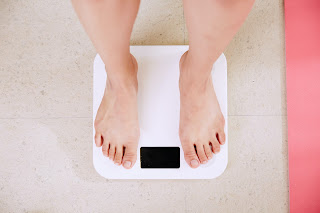How to Help Your Daughter Love Her Body
After graduating from high school early, my daughter Kate spent two months taking classes during the spring on a college campus. After two challenging years of dealing with mental health issues and an eating disorder, including a two-month in-patient stay at an eating disorder residence and four months of out-patient care in 2022, Kate was finally ready to launch. She knows what she wants to be when she grows up and has a concrete plan. Her life experiences have made her mature for her years and she's kind of an "old soul." Kate also has great social skills and a strong work ethic. When we dropped her off at her new dorm in April we all felt confident she was well prepared to make friends, work hard in school, and live on her own.
And yet despite all that she has going for her, and the many new friends she met and connected with, Kate deliberately chose to eat many of her meals alone. What she said to me was, "Mom, I've come too far and worked too hard to derail my health and mindset by the the toxic, dieting culture that MOST teenage girls embrace."
Kate rattled off a dozen examples to me and all of them included some variation of the following statements made by college girls:
- "I ate lunch, so I probably shouldn't eat dinner."
- "I'm not eating carbs."
- "I'm so bad, I shouldn't eat."
- "I'm not eating sugar."
- "I"m trying to eat less than ________ number of calories today."
- I'm seriously such a pig.
- "My mom is worried I have put on weight (or might put on weight) in college."
- "I'm dreading going home because my mom automatically puts me on her diet plan."
- I bought jeans that are too small so they motivate me to lose weight.
- I can't wear this shirt today because I ate lunch and now I look bloated.
- Stop describing food and/or your body in a negative way. Stop saying you are bad or naughty for eating. Or that your french fries are so terrible. Or that you look/feel like a pig after eating. You will have moments that you feel you've made a poor eating choice. Some days you might overeat, that's the human condition. Some seasons of your life might be less health focused. But don't narrate these issues aloud for your teenager like a sin that should be stricken from the record. Stop voicing all forms of body and food negativity, cold turkey. At my house, I have learned not only to stop criticizing myself when I regret my food choices, I would never, ever criticize my body out loud. I don't want my girls to look in the mirror and focus on the parts they don't like.
- Stop commenting on your daughter's body. When we make comments to our girls about their body, they believe us. When we criticize, their flaws become an incontrovertible fact. And when we praise them for how thin they look, girls can become hung up on their ability to garner that praise. Only their body will eventually change and therefore the "thin" compliment becomes unreliable. Praising your daughter's weight encourages a toxic reliance on others noticing thinness. Then on days when the compliment doesn't come, or in seasons when your daughter isn't as thin as she once was, the absence of your compliments creates a vacuum in her self-esteem. To be clear, complimenting and building your daughter up is crucial. I encourage you to compliment her social skills, compliment her math test, compliment her cute pink slippers, and compliment her willingness to do dishes without complaining. But leave all body (weight) comments alone.
- Embrace an "All Foods Fit" mentality. Kale and gummy bears both have their place. Bacon and cheesecake aren't inherently evil. Egg whites and pancakes are both breakfast items. Food is food. It is something you put in your mouth and swallow. Unless you have a genuine allergy, resist the urge to strike food from the world stage and bury it in the basement. This shift in thinking is so powerful because it neutralizes food as the enemy. This doesn't mean that every minute of every day is now open season on gummy bears. You can talk to your daughter about food, but an "All Foods Fit" attitude prioritizes balance and nutrition over any kind of diet. My application of this principle can be seen, for example, in how I'm quick to remind my kids to drink enough water to stay hydrated, and to eat their vegetables at dinner so they're getting all their vitamins. But we also have dessert foods we love and enjoy together. The balance is in teaching about nutrition while allowing that all foods can fit.
- Make Food a Positive Conversation in Your Home. Shift all discussion about food to the mindset of health, nutrition, feeling good, and enjoying your life. Positive food discussions will encourage balance. They also will celebrate delicious things. A positive food mindset will be mindful of our body's needs, and teach our daughters to view eating as a wonderful, happy thing that can make us strong AND be enjoyable.
- Reject Diet Culture in Every Form. The side effect of number three and to embrace an "all foods fit" mentality is to completely reject all forms of diet culture. I listened to professionals from a variety of backgrounds and nutrition landscapes stress how deprivation, shaming, counting, and eliminating create an eventual backlash of toxic thoughts, feelings, and experiences for teenage girls. They might want to eat cleanly and perfectly, but when they don't, it can be devastating to their self-esteem. Also, diets are rarely sustainable, especially with teenagers. It's important with this one that I explain that you don't have to give up, and live out your days subsisting on potato chips. Your family might absolutely love going to the farmer's market and creating colorful salads every weekend. But all foods fit. Your daughter can love the farmer's market salad, and enjoy fruit snacks. I have people in my life who are loud voices advertising their diet regimen of choice. In response to one of these loud voices, my daughter unfriended this "diet guru" from Facebook because every time she read her "inspirational posts" she felt bad about herself. Red flag. Don't participate in any food culture or dieting regimen that makes you feel bad or guilty.
- Be Kind to Other Women. Practice self-discipline in how you notice and silently judge other women, even when it's harmless. Don't zoom in on social media posts or study Christmas cards to see who gained or lost ten pounds. When you catch yourself sizing up another woman's body, whether or not it's a compliment, shift your thinking. Try to notice other women for all of their amazing qualities without spending time considering their physical shape.
- Develop an "All Bodies Fit" attitude. One of the more powerful seminars I attended focused on how Western (and often white) beauty and body shape standards perpetuate a thin culture that is discriminatory to women of color and women from diverse cultural and biological backgrounds. Essentially, there are women all over the world who are genetically never going to achieve the Western standard that "thin = beautiful" without seriously compromising their health and/or native food culture. I'm really proud of global marketing campaigns that are working hard to perpetuate the attitude that "all bodies fit" by including diverse images of women's physical bodies. Just the other day I pointed out a Victoria's Secret ad to my daughter that had women with every skin tone and every body shape modeling underwear. And they were all beautiful! Of all my suggestions, I suspect this change in thinking is the most difficult. In the diversity sensitive climate in which we live, I think most adults are quick to give lip service and applause to the notion that "all bodies fit." But their endorsement for body diversity stops short of their own body or their daughter's body. As in, "I don't mind other women being curvy but that's not okay for my family." There is a disconnect in this kind of thinking that can be incredibly unkind to yourself, and especially your adolescent daughter. It's hard work to create new thinking patterns, but hold yourself to a higher standard. Your family deserves better than that. The "all bodies fit" attitudes includes you and your daughter, in every season of life!
- Follow @diet.culture.rebel on Instagram. She is a certified nutritionist and in my opinion, represents a modern, 2023 attitude toward health, body image, and food that can heal our daughters and help them to love their body. Her posts will inspire you to love yourself, your body, and to make peace with food!


I wish I’d had this information a loooong time ago, it would have made life easier for all my girls…and myself
ReplyDeleteThis is so right. I'm 74 years old and healthy and active, and i have boundless energy. I sleep well and work hard. I swim and walk 7 days a week, and I do my own yard work and house work. I paint walls and caulk tubs and play with grandkids. And my doctor says that at 170 pounds i am "obese." I'm fine. The last time i was sick was Feb, 2020, when i got a new virus called covid on a trip to China.
ReplyDelete